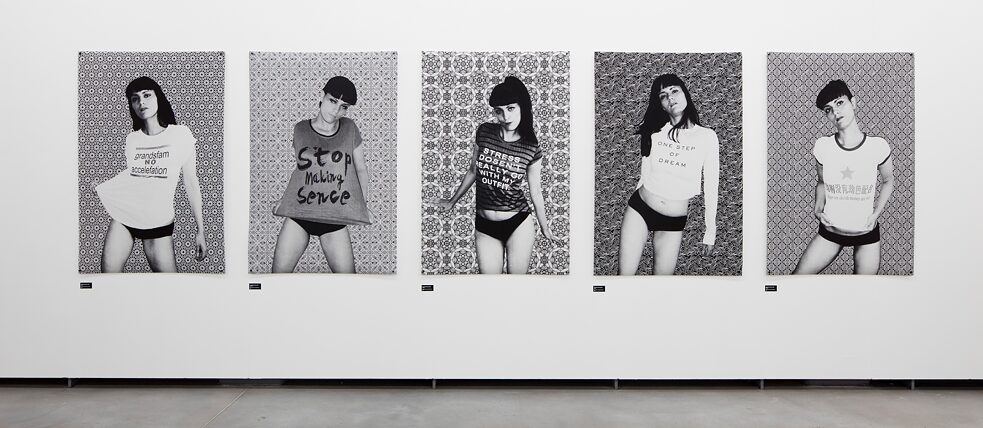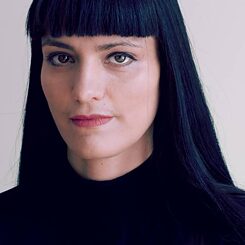The photo series New Silk Road Patterns #02 is a reference to the ancient trade route that connected China through the Middle East with the Roman Empire. New Silk Road Patterns #02 takes this history as its point of reference. It involves collecting low-quality clothes found at various markets in Tehran, Tokyo, Beijing, Dubai and Istanbul. A common though not predominant indication evident on these clothes is spelling mistakes: often language is used as patterns, letters are randomly combined, copy/paste text is used, well-known western brands of clothes and logos are sampled and deconstructed. Following the production and sales routes of these textiles, the project New Silk Road Patterns #02 is connecting five different Far Eastern and Middle Eastern places through photos of the artist wearing patterns of a deconstructed, seemingly "universal" language that is created somewhere between those places. Context specifics mix with random Shanzhai artifacts: the photographs combine high-contrast black and white shots that resemble fashion advertising with stock-photo images of traditional "Eastern" patterns.The series is printed on rice paper, adding a Far Eastern materiality to the black and white aesthetics.
Anahita Razmi | Born in 1981 in Hamburg | Lives and Works in Berlin
Anahita Razmi studied at Bauhaus-University Weimar, the Pratt Institute New York and the State Academy of Art and Design Stuttgart, prior to exhibiting widely internationally and at numerous institutions like Zachęta National Gallery of Art, Warsaw, Kunstraum Innsbruck, Austria, Kunstmuseum Stuttgart, Germany, Kunsthalle Baden-Baden, Germany, The National Art Center, Tokyo and within the 55th Venice Biennale.
Her video, installation and performance works focus on issues of identity and gender and examine processes of cultural appropriation in which the meanings of existing images, artefacts and thus identities are questioned by situating them in another context. Razmi often uses strategies of disarrangement to consider structures of perception within consumer and pop culture against the background of different communities between "the West" and "the Middle East". The Islamic Republic of Iran, with its current political and social conditions and relations, remains an open, ambivalent point of reference. Razmi was the recipient of the Goethe at Lux Residency (2018), the Werkstattpreis of the Erich Hauser Foundation (2015), the MAKSchindler Artists and Architects-in-Residence Program, Los Angeles (2013) and the The Emdash Award, Frieze Foundation (2011). Her work is included in several international collections like the Kunstmuseum Stuttgart, the Museo Novecento, Florence and Davis Museum at Wellesley College, USA.

